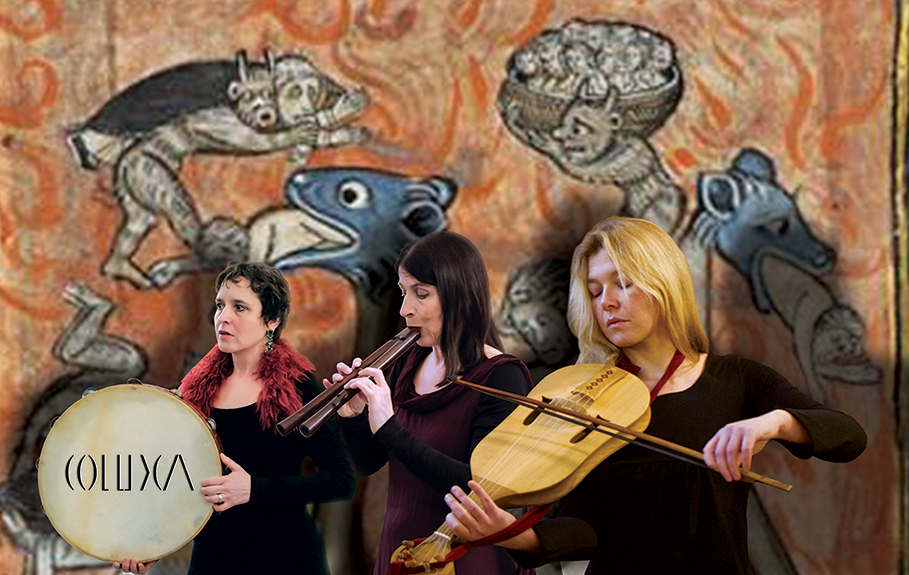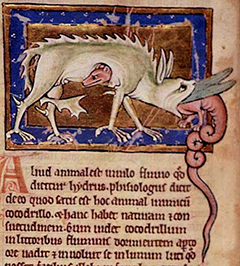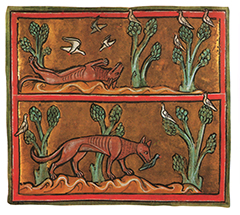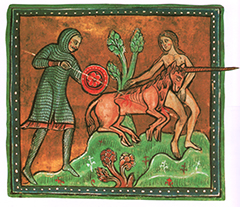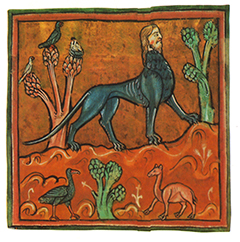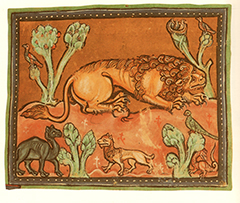ENSEMBLE COLUSCA
f.l.t.r: Cora Schmeiser – voice; Lucia Mense – recorder and traverse flute; Susanne Ansorg – fiddle, rebec and other stringed instruments.
PROGRAMS
• Der Seelen Paradies
Of heavenly and earthly love in the music of the Middle Ages
With the program Der Seelen Paradies, COLUSCA lifts you up from worldly events, sings of earthly and heavenly love through the 800-year-old music of the Middle Ages and illuminates the paradise present in the soul. Like pilgrims entering a church, COLUSCA observes and sings about different stations of St. George's Church in order to finally immerse itself in the paradisiacal sensory and emotional levels of the Hortus conclusus. In there you find wondrous nature as a reflection of the five human senses. Mary, the so-called Queen of Angels, presides there in love and sentiment. The praise of Man's soul that possesses paradise is sung in the Codex Engelberg. This is an occasion to trace these timbres of life and seek the angelic light connection in a future-oriented manner. With Hildegard von Bingen's vision of the center of mysteries and her song to the Angels, which contains 800 years of wisdom, we rise above everyday life for a moment.
• Golden light of heaven
Through the year with angels
Angelic beings are considered mediators between man and God, interpreters of events and bringers of salvation. In particular, the archangels: Gabriel, who brings Mary the Annunciation; Raphael, the angel of salvation and Michael the leader of the heavenly hosts. According to the book of Revelation, he defeats Satan and brings him down. The fallen angel ravages the earth and destroys souls.
In the Middle Ages, devotion to Mary was the rite of choice for angelic music: Mary, the star of the sea, shines above the angels. According to the legend aurea, Mary's Assumption is accompanied by angelic choirs, jubilation, dancing and instruments. Even hell - reluctantly and with much shouting - joins in the praise.
The music historian Elias Solomon wrote in 1274 that all music was created by angels because jubilation was part of their nature. The language of angels is Latin. Later songs engage the people by narrating the event in the local language, and the Gloria of the Angels is sung in Latin. Angelic music is monophonic - like an undivided song of praise addressed to God. Only in the Middle Ages was three-part music perceived as particularly solemn: an image of heavenly music celebrated by angels.
Guest: Vincent Kibilis, harp.
• Behind the clouds the morning dawns - Inter nebulas stella matutina
Sense and madness in manuscripts from the 13th to 16th century in honour of Saint Dympna
'Behind the clouds shines the morning light' has its origins in the legend of St Dympna, an Irish princess of the seventh century. In the Office of St Dympna of Geel, she is sung of as the patron saint of those who have 'lost their heads'. Dympna's life story includes her strength, her education, the abuse by her father, her beheading and ultimately her martyrdom. A programme with unique melodies and texts that can be heard for the first time in 500 years.
• O Seel', wo bistu morgen?
'Weltschmerz' and 'Himmelsglück' in medieval music
With the program O Seel', wo bistu morgen?, ensemble COLUSCA creates a musical bridge between the emotions of the medieval plague and the current pandemic. They present works by van Veldeke, Anna von Köln, de Sisteron, Hildegard von Bingen and various medieval manuscripts like Llibre Vermell, Codex Paris BN Fr. 844.
The three COLUSCA-members are fascinated by the "verdigris from the Middle Ages". By rubbing it off, they manage to expose concealed musical treasures. The trio treats the patina with voice, flute and fiddle, and brings into the light texts that appear almost dadaistic. As proven specialists in early European music, the three musicians succeed to keep their interpretations fresh and up to date.
COLUSCA features Rotterdam resident Cora Schmeiser, who matches contemporary songs and sound poetry with songs and poetry from the past; Lucia Mense (Cologne) - recorder and traverse flute - who performs repertory from all times and improvises on that rich material; and Susanne Ansorg (Dresden), who plays all over the world on fiddle, rebec and other instruments, who also contributes to the research into medieval stringed instruments, and serves as the artistic leader of the montalbâne-festival. The three musicians also meet regularly at Ars Choralis Coeln projects and concerts.
Click here for the extended biographies
Recording of COLUSCA's performance in August 2020 during the festival “Wunderhören” in Worms, Germany.
Heinric van Veldeke: Tristran muose sunder sînen danc
Albertet de Sisteron: Belle m’eis la veis altana
